What is Google Doing with People-First Content and Ecommerce SEO?
Google’s results have changed dramatically over the last several years, with their continued focus on rewarding "People-first content" that is created for actual people (not search engines) and then shaking up ecommerce searches as they're showing product details pages as the first result instead of just sending them to a product category page (most often Amazon’s category page). These updates to SERPS makes product page SEO more important than ever, where merchants need to efficiently optimize their product page with Helpful Content that gives the end-customers a satisfying experience.
We run into a lot of merchants who don't know a lot about what has been happening, so this article is to summarize what is going on that you really should know about....and the considerations they will present to you for ecommerce marketing as you try to navigate through this new landscape.
To start....here's a short list of important things that impact ecommerce merchants that Google has done with a short summary of each, which will get you caught up to the main things that have happened.
A Quick Side Note (Before we get to Google's New Ecommerce "Merchant Listing Experiences" for Product Searches)
Before we dig into Google's new "Merchant Listing Experiences" (not the merchant center listings) which is critical for ecommerce product searches specifically...it's important to know how Google's "helpful content" focus has impacted information around products and the posts that are focused on those. As Google has steered it's focus on "People-first content", Answerbase was happy to find that our customers were doing a great job in providing that Helpful Content through answering their customer questions. We knew Q&A was the root of what content marketing should be, but seeing how it performed through Google's March 2024 Core Update was satisfying as we saw Google practicing what they were preaching and rewarding content that was truly "people first". See what happened from February 2024 through the end of May 2024 for a broad range of Answerbase customers and their Q&A content (as reported through Ahrefs).
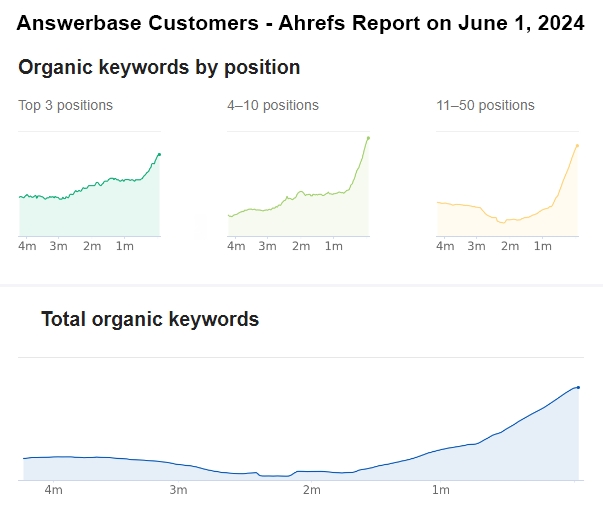
So, the Q&A content has thrived and it's displaying in traditional organic results, "People Also Asked", Featured Snippets, Thumbnails, etc. We wrote a post going through all of the different types of results that Q&A content created and published through Answerbase was showing. The most important impact for merchants though may through the lift we saw on Google's new "Merchant Listing Experiences"....let's dig into what those are here.
Now....Let's Talk About Google's "Merchant Listing Experiences" in Search Results
Starting in January of 2024, when you do a search for "Basketballs" or "Lipstick" or any number of other product searches (what was traditionally product category level searches), Google started showing a table of products in the organic listings that started overtaking the category page listings of ecommerce merchants. See example here of a search for "basketballs" and notice that it's not the "Shopping" tab....it's just the default organic results:
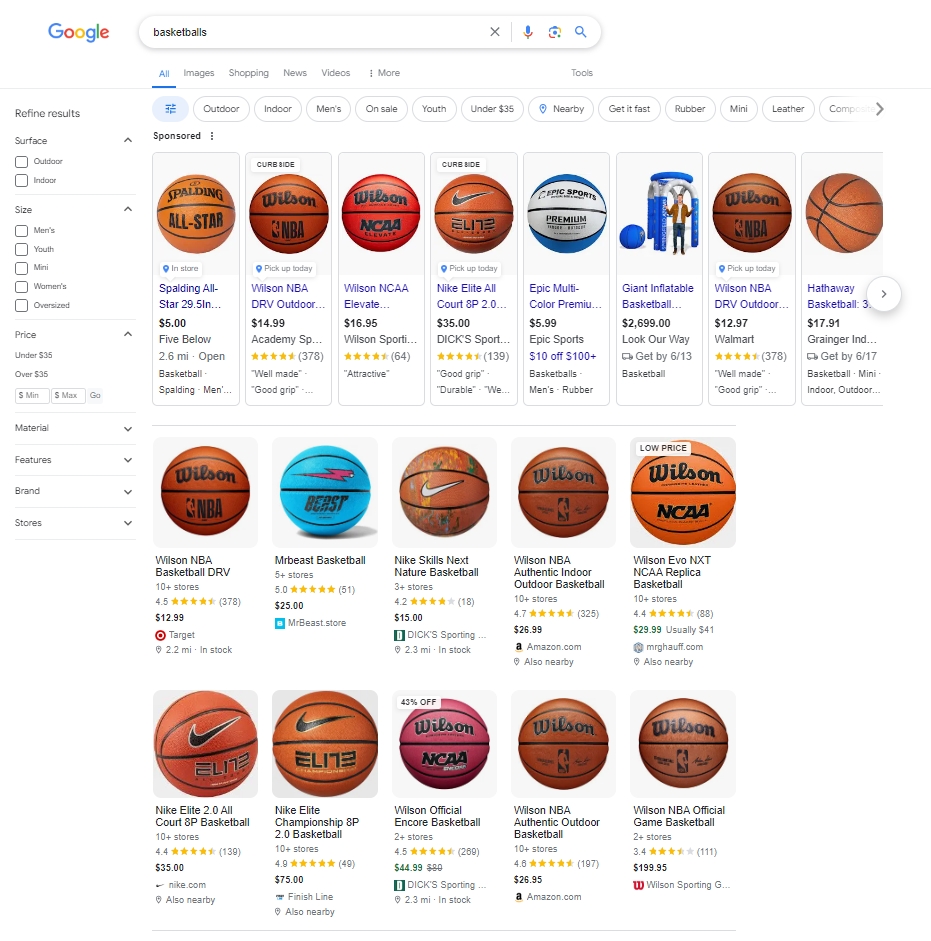
See another example here for the search "Listick" and see that it's overtaking the #1 organic listing....and bumping down what is traditionally a product category page on Sephora (same thing with "basketballs" above where Amazon and xxxx Sporting Goods category pages were previously in the top organic spots).....see the Lipstick example here:
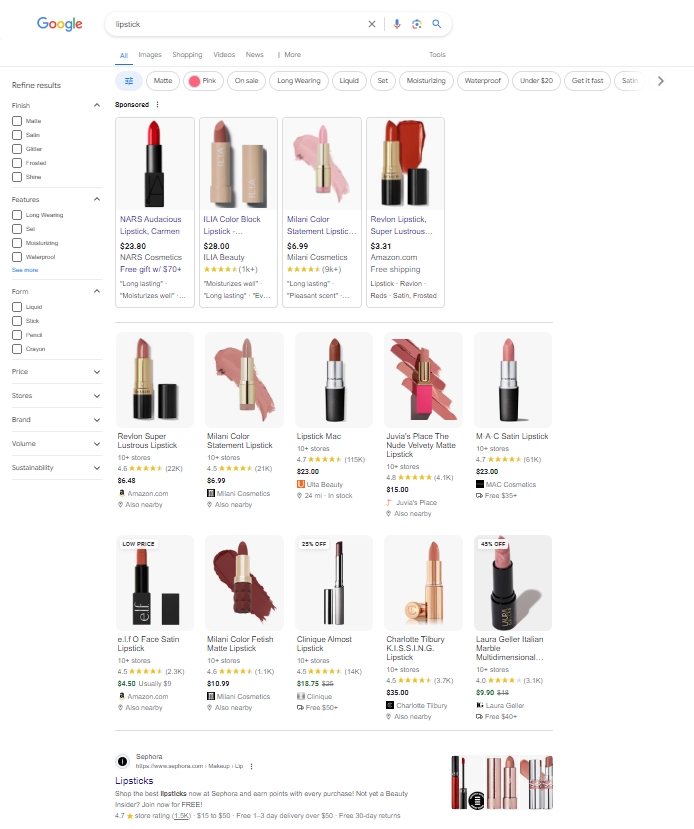
These types of results are called "Merchant Listing Experiences" and Google communicated what these results are and how they're pulled back in 2022. They started creeping up in organic results for what was traditionally a category-level search at the end of 2023, but in 2024 they started taking over the number one spots. A couple of important notes about these results.
More and more when we do category-level searches, these are dominating the search results and Google is also getting creative with how they display them and organize products based on the product specifications and aspects of the offer. In the above examples you see that there are filtering options to narrow down your product search within these listings, but depending on the search, Google also does this within the results themselves as you can see in this example with a search for "natural wool rugs" and see how rich this result is:
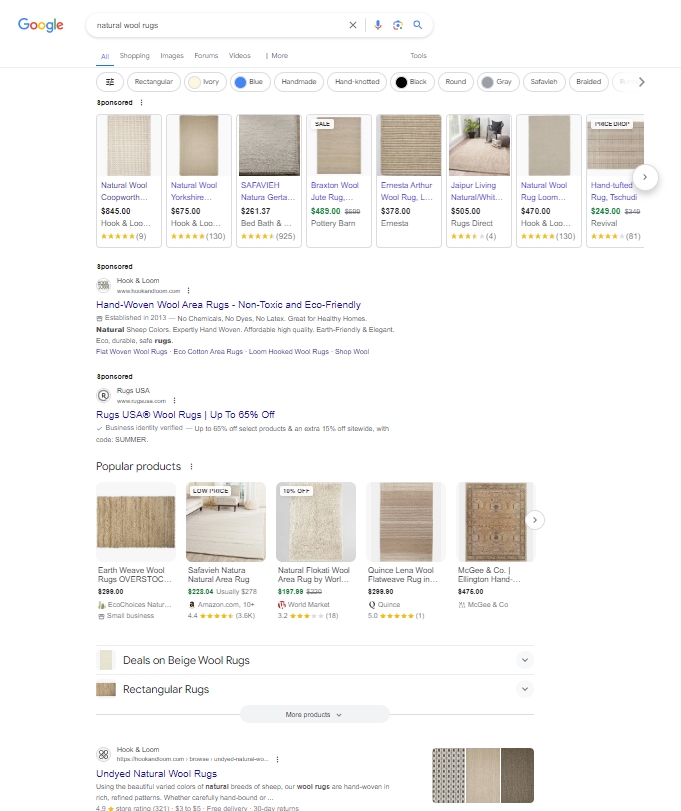
You'll see the "Deals on Beige Wool Rugs" and "Rectangular Rugs".....so it's letting the customer dig down into the type of rug they may be interested in right within the search results itself to find the specific product that they will consider purchasing. You'll also see a "More Products" option under that where if you click on that...it expands the whole result with more options for products and types of products to consider related to that search.
Now, with these results it may impact not only your organic and SEO considerations, but also your paid ads. If your customer acquisition is mostly through PPC campaigns then this may be some serious competition to the performance of those campaigns because of how organic listings have traditionally performed compared to sponsored listings. See the chart below which was part of a larger CTR analysis by FirstPageSage and notice how the click-through rates compare between paid and organic listings.
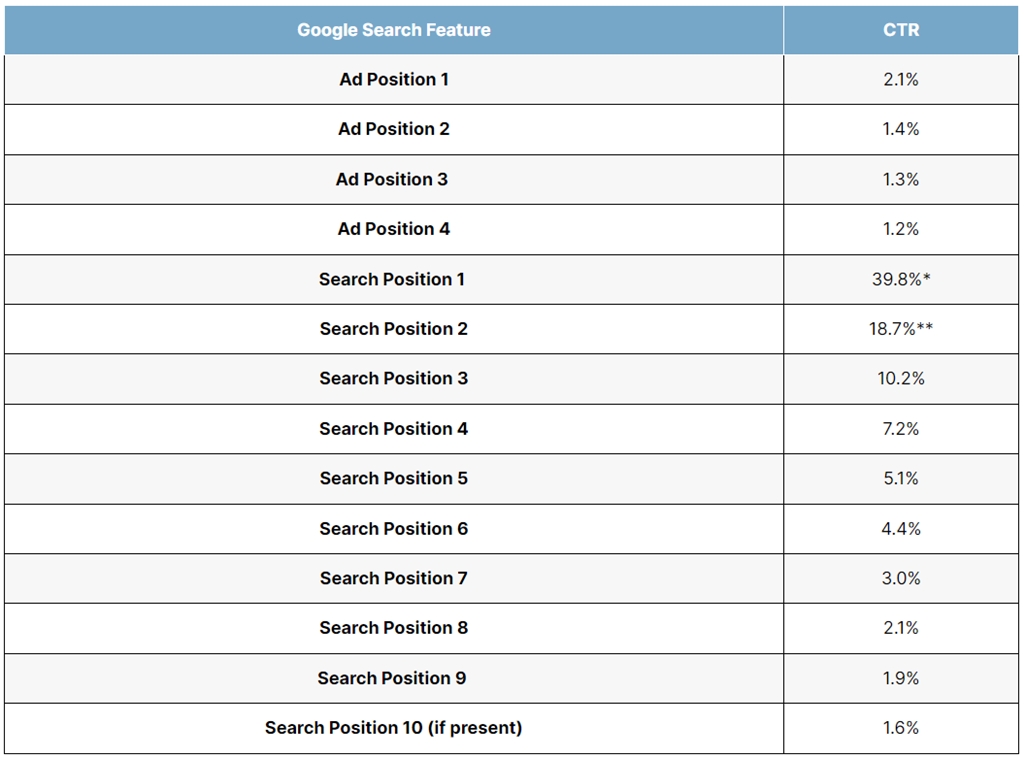
So, just something to be aware of and consider if you start to see any impact on your paid ecommerce campaign performance.
Now that you know what the "Merchant Listing Experiences" are...the question is...what do you do with that information and how do you optimize the position of those listings? As Answerbase has been speaking to many customers related to their SEO efforts, the one thing that is becoming clear is that Product Page SEO has been grossly inefficient for a long time...and the manual processes that have governed these "Product Page SEO" efforts are inadequate. On demos we've heard of customers with over 80K products on their site and when we ask them how many they optimize per month with original helpful content.....they say they are optimizing 10-20 per month. This isn't fast enough and the thought of optimizing a large number of product pages can become overwhelming if not done effectively and efficiently.
The good news is, through a very focused page-by-page optimization workflow and utilizing the efficiencies that AI has brought to the table.....we see customers optimizing their product pages and seeing lift in those "Merchant Listing Experiences" positions and taking less than 5 minutes per page to do so. See the example below, the listings that are highlighted....that ecommerce site had an average "Product Results" (filter available in Google Search Console) of 17.5....and after utilizing Answerbase's AI-Enhanced Product Page SEO Workflow (less than 5 minutes per page) you'll see how it's taken over several spots in the top 10.
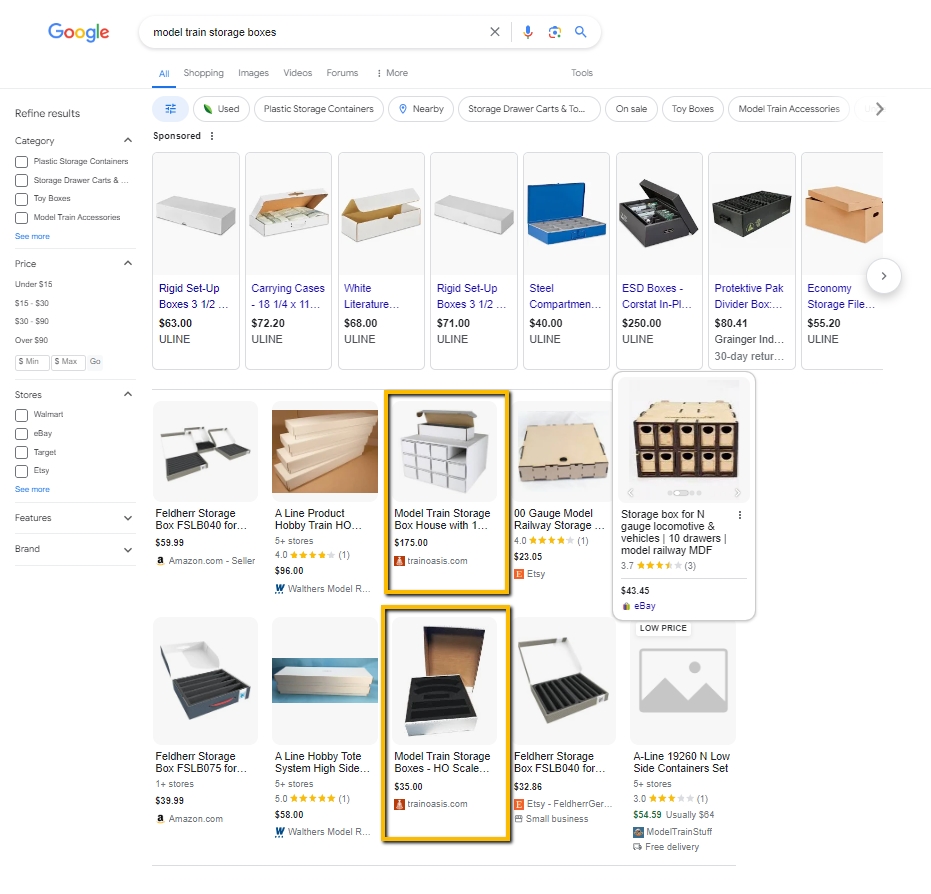
That is a site that is NOT on Merchant Center and we've seen that first product sometimes even take over the #1 spot from Amazon. This position lift was a result of utilizing our proprietary AI-enhanced product page optimization workflow where we focus on your products that are most valuable for you and propose Product Page Q&A content that will be both helpful for your customers (which is important for both SEO and conversion) and also is auto-optimized for the appropriate short-tail keyphrases which will provide lift on these Merchant Listing Experiences searches. See a preview of the optimization tool here focused on a specific product:
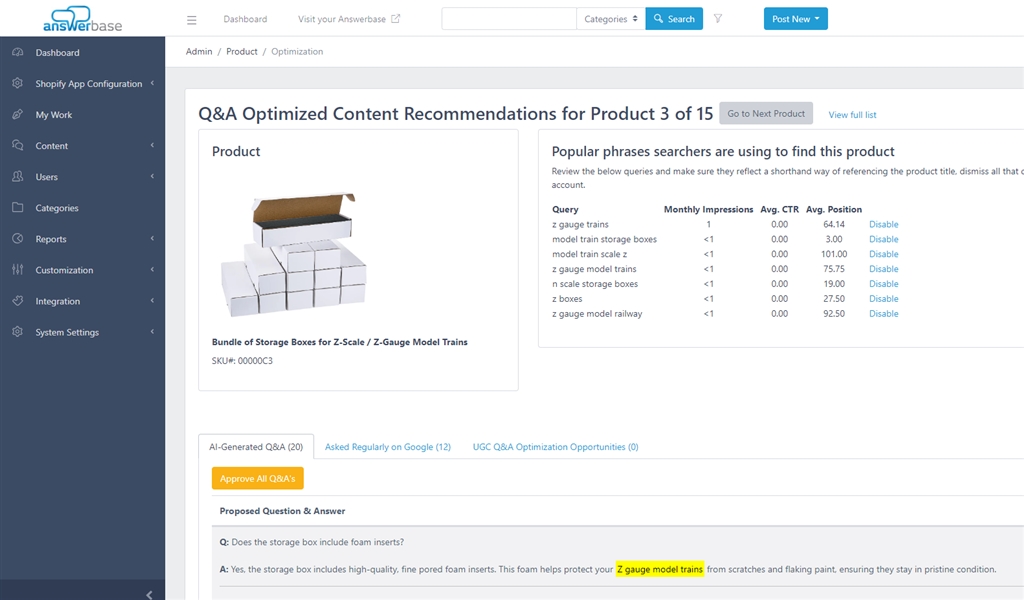
Answerbase can feed you with (1) AI-proposed Q&A that is focused on the types of questions customers ask when related to that product which are automatically optimized for relevant short-tail phrases (2) pull in the questions related to that product that are regularly asked on Google with an AI-proposed answer so your team can ensure you're providing all of the valuable information related to that product that customers are searching for and (2) of course if you have any UGC from your own questions that your team is answering those will be pulled in and Answerbase recommends how you can optimize and publish that helpful content to your product pages as well.
Google is adjusting their core ranking signals to create an incentive for businesses to create "People-First Helpful Content" and Q&A helps satisfy these results, and with "merchant listing experiences" taking over product searches on Google...Product Page SEO is critical for merchants moving forward. We encourage you to book a demo today to talk about what Answerbase can do for your business.
We run into a lot of merchants who don't know a lot about what has been happening, so this article is to summarize what is going on that you really should know about....and the considerations they will present to you for ecommerce marketing as you try to navigate through this new landscape.
To start....here's a short list of important things that impact ecommerce merchants that Google has done with a short summary of each, which will get you caught up to the main things that have happened.
- Google Helpful Content Update: Google announced this as a specific update in 2022 and told the world that content should be created for people, with the main question content creators should ask themselves is “Do you have an existing or intended audience for your business or site that would find the content useful if they came directly to you?”. People request that content by asking questions....so of course we loved that:) It also reiterated that it didn't care how long the content is, so a 1-2 sentence answer can outperform an 800 word blog post....Google simply wants to satisfy the search intent.
- Google Helpful Content System: In late 2023 Google announced that it was adding a new "System" in their automated ranking systems called the "Helpful Content System". Google Search’s helpful content system generates a signal used by our automated ranking systems to better ensure people see original, helpful content created for people in search results. The helpful content system aims to better reward content where visitors feel they’ve had a satisfying experience. So, this took the "Helpful Content Update" and put it in steroids, as this was one of the signals that Google would use in their automated rankings to judge the quality of your pages and site as a whole.
- Google's March 2024 Core Update: In March 2024, Google escalated the importance of People-First Helpful Content once again as it rolled out a core update that incorporated its helpful content system into its core ranking systems. This update was a continuation of the September 2023 helpful content update, the update ran from March 5, 2024 to April 19, 2024. What this did was spread out the Helpful Content System and incorporated it into a variety of their signals and systems.
A Quick Side Note (Before we get to Google's New Ecommerce "Merchant Listing Experiences" for Product Searches)
Before we dig into Google's new "Merchant Listing Experiences" (not the merchant center listings) which is critical for ecommerce product searches specifically...it's important to know how Google's "helpful content" focus has impacted information around products and the posts that are focused on those. As Google has steered it's focus on "People-first content", Answerbase was happy to find that our customers were doing a great job in providing that Helpful Content through answering their customer questions. We knew Q&A was the root of what content marketing should be, but seeing how it performed through Google's March 2024 Core Update was satisfying as we saw Google practicing what they were preaching and rewarding content that was truly "people first". See what happened from February 2024 through the end of May 2024 for a broad range of Answerbase customers and their Q&A content (as reported through Ahrefs).

So, the Q&A content has thrived and it's displaying in traditional organic results, "People Also Asked", Featured Snippets, Thumbnails, etc. We wrote a post going through all of the different types of results that Q&A content created and published through Answerbase was showing. The most important impact for merchants though may through the lift we saw on Google's new "Merchant Listing Experiences"....let's dig into what those are here.
Now....Let's Talk About Google's "Merchant Listing Experiences" in Search Results
Starting in January of 2024, when you do a search for "Basketballs" or "Lipstick" or any number of other product searches (what was traditionally product category level searches), Google started showing a table of products in the organic listings that started overtaking the category page listings of ecommerce merchants. See example here of a search for "basketballs" and notice that it's not the "Shopping" tab....it's just the default organic results:

See another example here for the search "Listick" and see that it's overtaking the #1 organic listing....and bumping down what is traditionally a product category page on Sephora (same thing with "basketballs" above where Amazon and xxxx Sporting Goods category pages were previously in the top organic spots).....see the Lipstick example here:

These types of results are called "Merchant Listing Experiences" and Google communicated what these results are and how they're pulled back in 2022. They started creeping up in organic results for what was traditionally a category-level search at the end of 2023, but in 2024 they started taking over the number one spots. A couple of important notes about these results.
- These are Product Pages: These results are focused on specific product pages, and when you find the product/merchant you're interested in you are lead directly to the actual product page. So, Product Page SEO is more important than ever. Many times merchants have a ton of product pages so to be able to focus on your "bread and butter" products that are converting and optimize those product pages efficiently with the appropriate use of AI is critical to stay competitive in these results (we'll show examples below of how to gain position lift for these results).
- They Are NOT from Merchant Center: You do not need to have a Merchant Center account to be eligible for these results, any product page with product structured data is eligible for these results.
- They are NOT Sponsored Listings: Many merchants that we talk to, when first introduced to these results, they say "oh, those are paid listings"...but they are not. These are organic listings but do compete visually with how the sponsored listings display (this is important because of the CTR difference when comparing paid vs free listings, keep reading for more on that).
More and more when we do category-level searches, these are dominating the search results and Google is also getting creative with how they display them and organize products based on the product specifications and aspects of the offer. In the above examples you see that there are filtering options to narrow down your product search within these listings, but depending on the search, Google also does this within the results themselves as you can see in this example with a search for "natural wool rugs" and see how rich this result is:

You'll see the "Deals on Beige Wool Rugs" and "Rectangular Rugs".....so it's letting the customer dig down into the type of rug they may be interested in right within the search results itself to find the specific product that they will consider purchasing. You'll also see a "More Products" option under that where if you click on that...it expands the whole result with more options for products and types of products to consider related to that search.
Now, with these results it may impact not only your organic and SEO considerations, but also your paid ads. If your customer acquisition is mostly through PPC campaigns then this may be some serious competition to the performance of those campaigns because of how organic listings have traditionally performed compared to sponsored listings. See the chart below which was part of a larger CTR analysis by FirstPageSage and notice how the click-through rates compare between paid and organic listings.

So, just something to be aware of and consider if you start to see any impact on your paid ecommerce campaign performance.
Now that you know what the "Merchant Listing Experiences" are...the question is...what do you do with that information and how do you optimize the position of those listings? As Answerbase has been speaking to many customers related to their SEO efforts, the one thing that is becoming clear is that Product Page SEO has been grossly inefficient for a long time...and the manual processes that have governed these "Product Page SEO" efforts are inadequate. On demos we've heard of customers with over 80K products on their site and when we ask them how many they optimize per month with original helpful content.....they say they are optimizing 10-20 per month. This isn't fast enough and the thought of optimizing a large number of product pages can become overwhelming if not done effectively and efficiently.
The good news is, through a very focused page-by-page optimization workflow and utilizing the efficiencies that AI has brought to the table.....we see customers optimizing their product pages and seeing lift in those "Merchant Listing Experiences" positions and taking less than 5 minutes per page to do so. See the example below, the listings that are highlighted....that ecommerce site had an average "Product Results" (filter available in Google Search Console) of 17.5....and after utilizing Answerbase's AI-Enhanced Product Page SEO Workflow (less than 5 minutes per page) you'll see how it's taken over several spots in the top 10.

That is a site that is NOT on Merchant Center and we've seen that first product sometimes even take over the #1 spot from Amazon. This position lift was a result of utilizing our proprietary AI-enhanced product page optimization workflow where we focus on your products that are most valuable for you and propose Product Page Q&A content that will be both helpful for your customers (which is important for both SEO and conversion) and also is auto-optimized for the appropriate short-tail keyphrases which will provide lift on these Merchant Listing Experiences searches. See a preview of the optimization tool here focused on a specific product:

Answerbase can feed you with (1) AI-proposed Q&A that is focused on the types of questions customers ask when related to that product which are automatically optimized for relevant short-tail phrases (2) pull in the questions related to that product that are regularly asked on Google with an AI-proposed answer so your team can ensure you're providing all of the valuable information related to that product that customers are searching for and (2) of course if you have any UGC from your own questions that your team is answering those will be pulled in and Answerbase recommends how you can optimize and publish that helpful content to your product pages as well.
Google is adjusting their core ranking signals to create an incentive for businesses to create "People-First Helpful Content" and Q&A helps satisfy these results, and with "merchant listing experiences" taking over product searches on Google...Product Page SEO is critical for merchants moving forward. We encourage you to book a demo today to talk about what Answerbase can do for your business.

